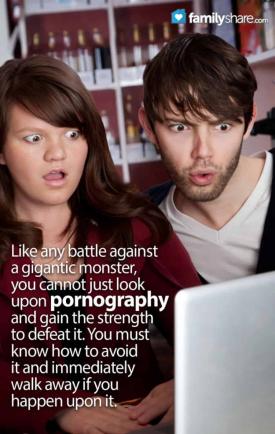
Nietzsche, a German philosopher who lived in the 1800s and who understood monsters as well as any of us, coined the above phrase.
For the purposes of this article, the monster is pornography. There's hardly a nice way to discuss pornography, but we can't pretend that viewing pornography isn't a huge problem for our youth. It is, however, a battle our kids should not have to fight alone.
Why are we comparing pornography to a monster? When repeatedly sought out, it devours us. It is an enormous and dangerous adversary that threatens children worldwide. Some avenues through which pornography is commonly accessed are:
Gaming
"� Parents be aware of the content of your children's downloaded or online games. They should not be playing Mature or Adult rated games. Do an Internet search on Entertainment Software Rating Board (ESRB) or other game rating sites.
Cell phones or smartphones with screens
"� Young children should not have cell phones with screens that have photo capabilities or Internet access, and if you're really on top of it, neither should teenagers.
Webcams
"� If you don't need a webcam in your home, don't have one. Kids can be impulsive and use poor judgment in their own webcam use and from whom they receive communications.
The Internet
"� If you have the Internet in your home, you have pornography in your home, and it's only a mouse click away. Pornography can be accidentally stumbled upon during a computer search for homework. Keep a family computer in a common area and have parental controls, which are not always fool proof, so communicate what it is they might/will come across and why it is harmful.
Like any battle against a gigantic monster, you cannot just look upon pornography and gain the strength to defeat it "� you must know how to avoid it and immediately walk away if you happen upon it.
The brain is the battleground wherein we fight this particular monster "� pornographic images permanently imprint into the, still developing, brain in three-tenths of a second and repeated viewing can shut down specific brain functions and rewire normal pathways. Keep in mind that the human brain is not fully mature until our middle twenties (Belnap, Dr. Dean, 2008. A Brain Gone Wrong: Hope for the Troubled Teen.Digital Legend).
Pornography is rampant in your child's world, and if you don't communicate (ahh...that well used word "communicate"�) with your child and address its dangers starting early, in age-appropriate dialogue, statistics are telling us that your children will be exposed to it without your knowledge.
According to Dr. Donald L. Hilton Jr, renowned neurological surgeon and a specialist on the effects of addiction on the brain: "Virtually all of our young men and women are already seriously exposed."� If your child has a problem with repeatedly seeking out pornography, make sure they do not feel ashamed. They need to know they are not alone. It is vital to seek help from a therapist who specializes in sexual addictions. Parents and youth "� communicate now with each other. There should be no judging, no guilt trips, and no shaming or anger involved with those communications.

